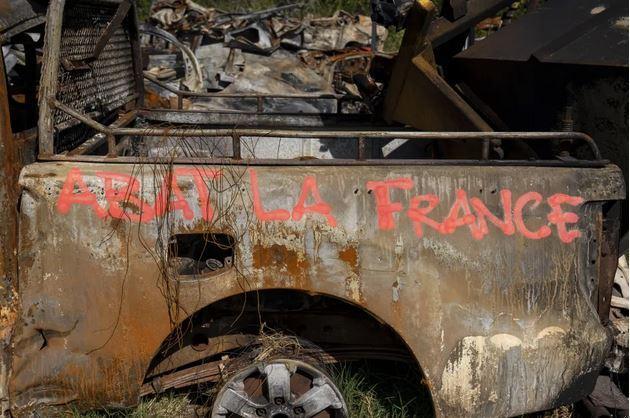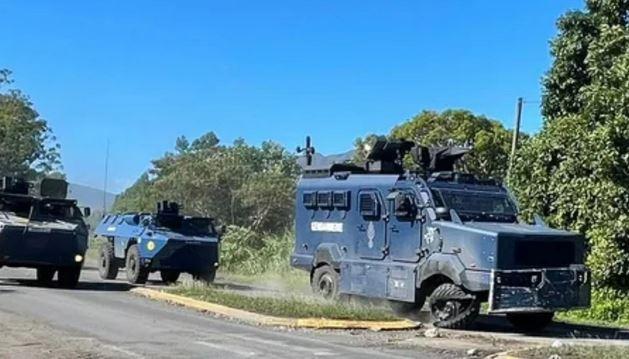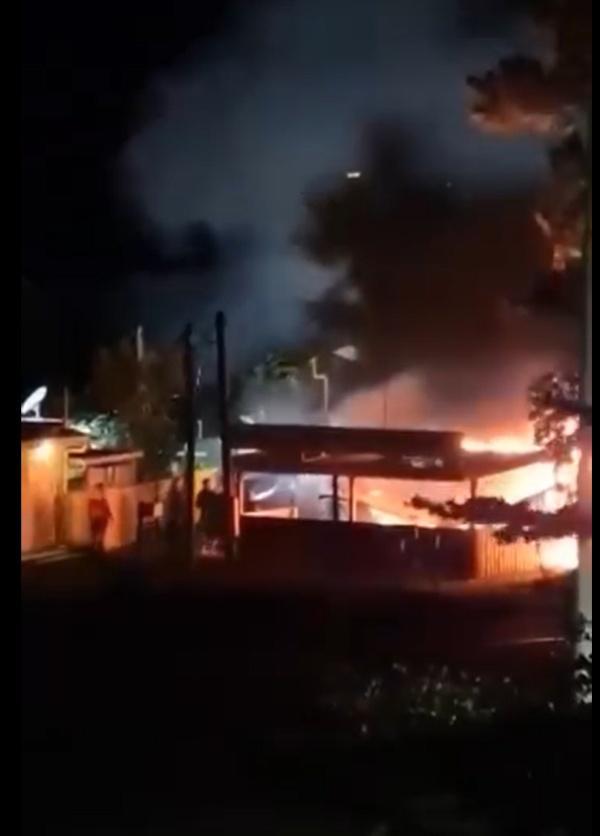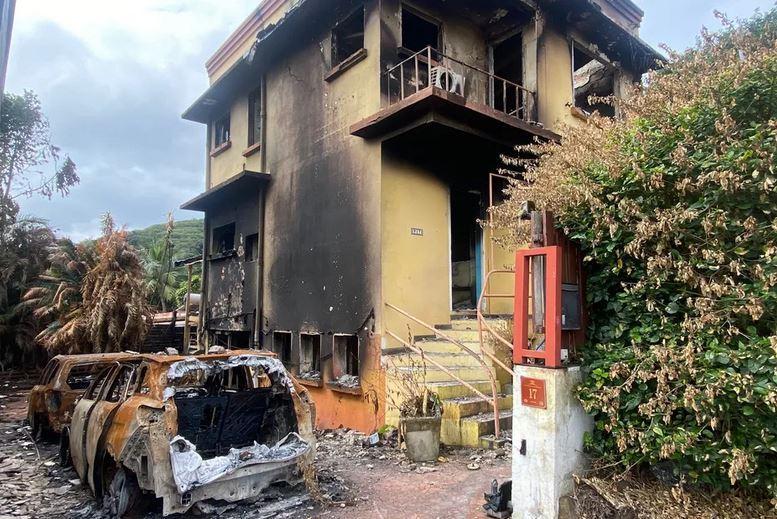
Last weekend, on the occasion of the European elections, new roadblocks were assembled in Nouméa by Kanak insurgents from the night of Saturday to Sunday June 9, strongly disrupting the latter. However, the State had done everything to try to preserve a semblance of normality, even if it means bringing together the 57 usual polling stations of Nouméa in 6 places (and the 296 offices of the 33 municipalities of the territory on 50 sites) or to advance the opening schedule at 7 a.m. Except that in the northern districts of the Grand Nouméa, in Dumbéa sur Mer, Le Pic aux Chèvres, Koutio and Apogoti, the clashes with the cops resumed at dawn, the four Savexpress tracks was blocked, and even the Robert-Abel school (Dumbéa) scheduled to welcome the voters was burnt down on June 5, following the announcement of its electoral assignment. For its part, the youth house in the district of Tuband (Nouméa) burned the day before the big circus, while no vote was able to take place in the blocked town halls of Kouaoua (the one where the nickel serpentine is regularly burned down ) and Ouvéa (the island where the soldiers had murdered 19 Kanak in 1988, then where the two leaders of the FLNKS [Kanak and Socialist National Liberation Front] had been killed the following year by a pro-independence Kanak opposed to their signing of the Matignon agreements with France).
In the end, the more or less voluntary abstention rate reached 87% in New Caledonia during these European elections. And no one will be surprised that of the 29,000 settlers and mainlanders (of more than 270,000 inhabitants) who went to the polls overprotected by the cops, the macronist candidate came first (28%) for her good and loyal services rendered to the loyalists, followed by candidates of the far right (the RN received 22%, Reconquest 16%) and the right (12%). But what does it matter, since after the dissolution of the National Assembly which followed this poor election, one of the consequences is that the famous reform which had served as a spark for the Kanak insurrection of May 13 will no longer be adopted in time (the constitutional revision was to enter into force on July 1, 2024). A de facto burial, ratified by President Macron, who finally announced on June 12 the “suspension” of this bill (but not its withdrawal, to the chagrin of those supporting independence).
More broadly, the security forces mention a current number of nearly 2,000 Kanak insurgents (out of the 10,000 estimated on May 13) and more than “about fifty roadblocks” regularly put in place after being cleared, sometimes booby-trapped with gas canisters or protected by metal spikes to puncture the wheels of intervention vehicles. Two gendarmerie supply trucks, a patrol vehicle, as well as a Centaur armored vehicle were put out of action last week by these traps. It should be recalled that of the 90 Centaurs equipped with optronic equipment and a firing turret that are to be deployed on French territory before the end of 2024, about thirty are destined for the overseas colonies: 6 have already been sent urgently by cargo plane to New Caledonia in early June, while 10 others (embarked on a Navy ship) are expected in Nouméa in the coming weeks.

At Mont-Dore
On Thursday, June 13, in the commune of Mont-Dore (located about ten kilometers east of Nouméa), a major operation was deployed at dawn between the tribe of Saint-Louis and La Coulée, mobilizing 200 mobile gendarmes and the GIGN, two helicopters and several armored vehicles to try to clear the roadblocks. Since the beginning of the insurrection, these roadblocks have blocked the road to the south, leading to the Prony nickel plant. And here again, the pigs not only had a run-in with the insurgents all morning, but several armored vehicles also had their tires ripped open by homemade booby-traps. It seems that Soframe – the company in the Alsatian town of Hangenbieten that designs and manufactures vehicles for the French army’s special forces and for the gendarmerie (including the Centaure) – had not predicted everything in this area.

In any case, in Mont-Dore, the third most populous commune in New Caledonia (28,000 inhabitants), there is not much left for the gendarmes to “save” after four weeks, since the rioters have already looted and destroyed everything they could, at least to the north of the city: the shops from the Pont-des-Français to Saint-Michel (Darty, four shops in Conception, a dozen in the heart of the city in Boulari, McDonald’s, etc.), but also street furniture, public lighting, electricity networks, video surveillance which had just been doubled (26 cameras destroyed out of 30), municipal buildings (town hall, offices, Pont-des-Français library, market, cultural centre, gendarmerie) or the Boulari college, which lost several classrooms and administrative rooms.
Oh yes, in fact there was still the electoral office of the Macronist deputy Nicolas Metzdorf, the one who had carried the famous bill on the “thaw” that had set off the powder keg on May 13, and is once again running for the next legislative elections in the name of the “union” of the Loyalists. Well, his offices in Mont-Dore went up in smoke on the night of June 13, a few hours after the gendarmes stormed the entire area.
To hold the streets of Nouméa, in the face of Kanak insurgents who are sometimes armed, it should also be noted that the gendarmerie has installed fixed firing posts at strategic crossroads. And that the official death toll increased again on June 11, to nine, after the announcement of that of Joseph Poulawa (originally from Ouvéa), shot dead by the GIGN on May 29 and who has since been in a coma. Which gives us the opportunity to put a name to the six Kanak who have lost their lives since the beginning of the insurrection:
- Djibril Salo (19), shot in the back on May 15 by loyalist settlers, on a roadblock in the Tindu district
- Nassaié Doouka (17) and Christian Neregote (36 years old), both shot in the head on May 20 in the Ducos district, by a business manager who suspected them of wanting to steal a vehicle in his warehouse
- Dany Tidjite (48), shot dead by an off-duty cop who was trying to break a roadblock in the Koutio district.
- Joseph Poulawa (34), shot twice in the chest and shoulder on May 28 in Dumbéa by the GIGN, who claims to have fired a “return shot” (six times). His death was announced on June 11.
- Lionel Païta (26 years old), shot in the head on June 3 by a gendarme at the Col de la Pirogue at the Saint-Laurent tribe roadblock, on the strategic road leading to the international airport. His death was announced on June 8.
As of June 13, the official toll of the authorities also amounted to 1139 arrests of rioters over the past month, as well as 177 police officers and 64 gendarmes injured (plus two gendarmes killed).

Destruction, sabotage and blackouts
A new assessment of destruction was released on June 11, this time from an expert, in this case the chairman of the New Caledonia Insurance Committee (Cosoda), Frédéric Jourdain. It currently lists 900 companies and small shops, 200 houses and 600 vehicles burnt down since the start of these four weeks of insurgency. “For Caledonia, it’s unheard of”, even after “climatic events” (the cyclonic season goes from November to April), he announces in an interview on the public television station La 1ère. He also confirms the figure of 1 billion euros in damage, and specifies this good old statistical method which means that insurance now refuses any new contract in Kanaky: “The principle of insurance is the random nature of the occurrence of a disaster. However, currently, there are very strong probabilities for these claims to occur. The instruction of our headquarters is therefore not to subscribe to new cases as long as free movement is not restored.”
To top it all off, we learned today, June 14, that the local government of New Caledonia (co-led by the FLNKS separatists and loyalist parties) has officially been in suspension of payments for several days, “taking into account the tax losses and social contributions”. It will therefore no longer be able to pay benefits or salaries after June (and even less the specific short-time working measures announced following the destruction), and has been in negotiations with the French state for a week to meet the immediate cash flow need, according to Louis Mapou, its president (FLNKS) since 2021.
It is therefore a little easier to understand why the various pro-independence politicians are constantly calling (and without much success) for an end to the fires, looting and especially for the lifting of the blockades, they who co-manage the government of the archipelago and cannot accept the systematic ravages of the economy undertaken by the young Kanak insurgents for several weeks, not to mention the sabotage against the mines and the two nickel factories (the third is dormant). By the way, the flagship of these nickel processing plants, that of Prony Resources, which announced its partial shutdown on June 7 following the sabotage of its critical infrastructure has just provided some details on this subject: it is both deprived of water following “the destruction of the pumping station”, and also power following “shots on a power line, depriving part of the industrial facilities” of electricity.